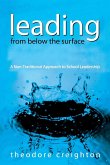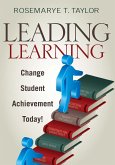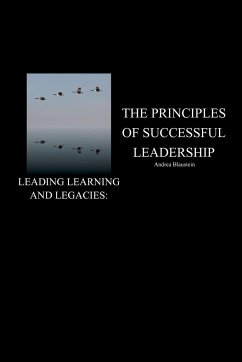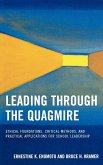- Broschiertes Buch
- Merkliste
- Auf die Merkliste
- Bewerten Bewerten
- Teilen
- Produkt teilen
- Produkterinnerung
- Produkterinnerung
Your shortcut to success for inspired school leadership! Tap your greatest leadership potential and quickly get on track to meeting today's complicated challenges with this follow up to the best-selling Learning
Andere Kunden interessierten sich auch für
![Leading From Below the Surface Leading From Below the Surface]() Theodore CreightonLeading From Below the Surface26,99 €
Theodore CreightonLeading From Below the Surface26,99 €![Leading and Supervising Instruction Leading and Supervising Instruction]() John C. DareshLeading and Supervising Instruction66,99 €
John C. DareshLeading and Supervising Instruction66,99 €![Leading From Below the Surface Leading From Below the Surface]() Theodore CreightonLeading From Below the Surface60,99 €
Theodore CreightonLeading From Below the Surface60,99 €![Leading Learning Leading Learning]() Rosemarye T. TaylorLeading Learning32,99 €
Rosemarye T. TaylorLeading Learning32,99 €![Leading Learning and Legacies Leading Learning and Legacies]() Andrea BlausteinLeading Learning and Legacies23,99 €
Andrea BlausteinLeading Learning and Legacies23,99 €![International Perspectives on Leading Low-Performing Schools International Perspectives on Leading Low-Performing Schools]() International Perspectives on Leading Low-Performing Schools62,99 €
International Perspectives on Leading Low-Performing Schools62,99 €![Leading Through the Quagmire Leading Through the Quagmire]() Ernestine K. EnomotoLeading Through the Quagmire103,99 €
Ernestine K. EnomotoLeading Through the Quagmire103,99 €-
-
-
Your shortcut to success for inspired school leadership! Tap your greatest leadership potential and quickly get on track to meeting today's complicated challenges with this follow up to the best-selling Learning
Hinweis: Dieser Artikel kann nur an eine deutsche Lieferadresse ausgeliefert werden.
Hinweis: Dieser Artikel kann nur an eine deutsche Lieferadresse ausgeliefert werden.
Produktdetails
- Produktdetails
- Verlag: Corwin
- 3. Auflage
- Seitenzahl: 288
- Erscheinungstermin: 11. September 2013
- Englisch
- Abmessung: 254mm x 178mm x 16mm
- Gewicht: 547g
- ISBN-13: 9781452260938
- ISBN-10: 1452260931
- Artikelnr.: 39129697
- Herstellerkennzeichnung
- Libri GmbH
- Europaallee 1
- 36244 Bad Hersfeld
- gpsr@libri.de
- Verlag: Corwin
- 3. Auflage
- Seitenzahl: 288
- Erscheinungstermin: 11. September 2013
- Englisch
- Abmessung: 254mm x 178mm x 16mm
- Gewicht: 547g
- ISBN-13: 9781452260938
- ISBN-10: 1452260931
- Artikelnr.: 39129697
- Herstellerkennzeichnung
- Libri GmbH
- Europaallee 1
- 36244 Bad Hersfeld
- gpsr@libri.de
Joyce S. Kaser (EdD, American University, Wash-ington, D.C.), is a Senior Program Associate with WestEd. She is also President of Kaser and Associ-ates and is a Senior Research Associate with The Study Group. She is first author of Enhancing Pro-gram Quality in Science and Mathematics, also published by Corwin Press, in 1999. This book presents an approach, called profiling, to forma-tive evaluation of programs that support mathe-matics and science education. Over the past de-cade, Dr. Kaser has been one of the key developers of this methodology. She has also been an evalua-tor of state, urban, and local systemic change ef-forts, along with numerous national and statewide professional development programs. Currently, she is part of a team developing statewide criteria for professional development and serves as the coprincipal investigator of re-search for an online learning program. She assists a major professional devel-opment provider implement profiling as its approach to quality assurance. A former teacher and school administrator, Dr. Kaser is coauthor of a change management methodology for use in education, along with a risk analysis as-sessment process for large system interventions. This new book brings to-gether her work in professional development, evaluation, change manage- ment, lifelong learning, and group leadership. Susan Mundry is currently deputy director of Learning Innovations at WestEd and the associate director of WestEd′s Mathematics, Science, and Technology Program. She directs several national or regional projects focused on improving educational practice and oversees the research and evaluation projects of Learning Innovations. She is codirector of a research study examining the distribution of highly qualified teachers in New York and Maine for the Northeast & Islands Regional Education Laboratory and is the project codirector for the evaluation of the Intel Mathematics Initiative, a professional development program for elementary and middle grades teachers aimed at increasing student outcomes in mathematics. She is also a Principal Investigator for two National Science Foundation projects that are developing products to promote the use of research-based practice in science and mathematics. Since 2000, Mundry has codirected the National Academy for Science and Mathematics Education Leadership, which provides educational leaders with training and technical assistance on professional development design, leading educational change, group facilitation, data analysis and use, and general educational leadership, as well as access to research-based information to improve teaching and learning. Building on this work, she provides technical assistance to several large urban schools districts engaged in enhancing leadership and improving math and science programs. As a senior research associate for the National Institute for Science Education (1997-2000), Mundry conducted research on attributes of effective professional development. She served on the national evaluation team for the study of the Eisenhower Professional Development program led by the American Institutes for Research, where she worked on the development of national survey instruments and the protocols for case studies. From 1982 to 1997, Mundry served in many roles from staff developer to associate director at The NETWORK, Inc., a research and development organization focused on organizational change and dissemination of promising education practice. There, she managed the work of the National Center for Improving Science Education and the Center for Effective Communication, provided technical assistance to schools on issues of equity and desegregation, oversaw national dissemination programs, and co-developed the "Change Game," (Making Change for School Improvement) a simulation game that enhances leaders′ ability to lead change efforts in schools and districts. Mundry has written several books, chapters, and articles based on her work. She is coauthor of the best selling book, Designing Effective Professional Development for Teachers of Science and Mathematics (2nd edition), as well as Leading Every Day: 125 Actions for Effective Leadership, which was named a National Staff Development Council Book of the Year in 2003. Her latest book is The Data Coach′s Guide to Improving Learning for All Students (2008). Katherine E. Stiles brings 20 years of experience to her current work as a project director and senior program associate at WestEd, and is co-director of WestEd′s National Academy for Science and Mathematics Education Leadership. As a senior staff member on Using Data Project, a collaboration between TERC and WestEd, Stiles co-developed the professional development program and provided technical assistance to the participating schools engaged in collaborative inquiry into data. She was awarded the Paul D. Hood Award in 2002 from WestEd for Distinguished Contribution to the Field. Stiles is co-author of the Corwin Press book, Leading Every Day: 124 Actions for Effective Leadership (2005), which received the National Staff Development Council′s 2003 Outstanding Book of the Year Award. She has co-authored or authored additional Corwin Press titles, including Designing Professional Development for Teachers of Science and Mathematics, Second Edition (2003), and the Facilitator′s Guide to Leading Every Day (2006). Stiles has degrees in psychology, education, and special education. Susan Loucks-Horsley was the lead author of the first edition of Designing Professional Development for Teachers of Science and Mathematics and directed the professional development research for the National Institute for Science Education on which the book is based. At the time of her passing in 2000, Susan was the associate executive director of Biological Sciences and Curriculum Study (BSCS) and senior research associate for science and mathematics at WestEd. She had previously served as director of professional development and outreach at the National Research Council′s Center for Science, Mathematics, and Engineering Education, where she promoted and monitored standards-based education, especially the National Science Education Standards. Susan was a leading researcher, writer, and professional developer who enjoyed collaborating with others to address education′s toughest problems. She was the lead author of several books, including Continuing to Learn: A Guidebook for Teacher Development, An Action Guide for School Improvement, and Elementary School Science for the 90s. In addition, she wrote numerous reports on teacher development for the National Center for Improving Science Education, as well as chapters and articles on related topics. While at the University of Texas/Austin Research and Development Center for Teacher Education, she worked on the development team of the Concerns-Based Adoption Model (CBAM), a classic framework for understanding and leading change efforts.
Introduction
Book One: Leadership Every Day
Day 1: We Are All Leaders
Day 2: Effective Leadership Practices
Day 3: Making Conscious Choices
Day 4: Committing to a Moral Imperative
Day 5: Using Power Appropriately
Day 6: Building Shared Vision
Day 7: Promoting Diversity
Day 8: Leading For Results
Day 9: Using Habits to Our Advantage
Day 10: Generating and Sharing Knowledge
Day 11: Keeping a Client-Centered Focus
Day 12: Recognizing and Celebrating Success
Day 13: Networking
Day 14: Embracing Innovative Thinking
Day 15: Aligning Actions and Beliefs
Day 16: Examining Your Culture
Day 17: Building a Trusting Climate
Day 18: Collaborative Leadership
Day 19: Building Relationships
Day 20: Trying Something New
Day 21: Coping with Ambiguity, Change, and Confusion
Day 22: Leading Through Crisis
Day 23: Balancing Leadership and Management
Day 24: Living with Paradox
Day 25: Paying Attention to Leadership Actions and Traits
Day 26: Getting Support
Day 27: Asking Good Questions
Day 28: Finding Win/Win Solutions
Day 29: Modeling Leadership
Day 30: Ethical Leadership
Day 31: Doing the Right Thing
References
Book Two: Leading Change
Day 1: Change as a Process
Day 2: Change Happens in People First
Day 3: The Impact of Change
Day 4: Moving through the Stages of Change-Concerns
Day 5: Moving through the Stages of Change-Behavior
Day 6: Change as Continuous Improvement
Day 7: Speed of Change
Day 8: The Missing Piece in Change
Day 9: Balancing Constants and Change
Day 10: Recognizing Assumptions
Day 11: Crafting a Shared Vision
Day 12: Mission and Goals
Day 13: Motivating Others
Day 14: Planning for Change
Day 15: Origins of Change
Day 16: Accepting Loss
Day 17: Dealing with Disappointment
Day 18: Change and Resilience
Day 19: Facing Problems
Day 20: Neutralizing Resistance
Day 21: Capitalizing on Resistance
Day 22: Knowing Your Constituents
Day 23: Managing Multiple Change Efforts
Day 24: Systems Thinking
Day 25: Examining Change History
Day 26: The Downside of Change
Day 27: Building Ownership for Change
Day 28: Individuals as Agents of Change
Day 29: Self-Assessment as a Change Leader
Day 30: Sustaining Individual Leadership
Day 31: Initiating, Implementing, and Institutionalizing Change
References
Book Three: Leading Learning Communities
Day 1: Leading Communities of Learning
Day 2: Leading Learning in Organizations
Day 3: Building Cultural Proficiency
Day 4: Powerful Learning Experiences
Day 5: How People Learn
Day 6: Transformative Learning
Day 7: Transforming Situational Learning
Day 8: Defining Expertise
Day 9: Characteristics of Effective Professional Learning
Day 10: Aligning Beliefs and Behaviors
Day 11: Designing Professional Development
Day 12: Committing to Vision and Standards
Day 13: Using Data to Guide Professional Development Designs
Day 14: Inputs into Professional Development Design
Day 15: Knowledge and Beliefs in Science and Mathematics
Day 16: Professional Development in Context
Day 17: Critical Issues to Consider
Day 18: Ensuring Equity
Day 19: Strategies for Professional Learning
Day 20: Selecting and Combining Strategies
Day 21: Professional Development for Student Impact
Day 22: Balancing Philosophy and Pragmatism
Day 23: Incorporating Reflexive Practice
Day 24: Reaching Everyone or Scaling Up
Day 25: Team Learning
Day 26: Sharing Knowledge and Capturing Lessons Learned
Day 27: Using Program Logic Models
Day 28: Achieving Realistic Outcomes
Day 29: Gathering Evaluation Data
Day 30: Leading Learning by Example
Day 31: Taking Responsibility for Learning
References
Book Four: Leading Effective Groups
Day 1: Leading Groups
Day 2: Four Roles of Group Leaders
Day 3: Group Norms of Collaboration
Day 4: Group Norm #1-Pausing
Day 5: Group Norm #2-Paraphrasing
Day 6: Group Norm #3-Posing Questions
Day 7: Group Norm #4-Putting Ideas on the Table
Day 8: Group Norm #5-Providing Data
Day 9: Group Norm #6-Paying Attention to Self and Others, Verbal
Communication
Day 10: Group Norm #6-Paying Attention to Self and Others, Nonverbal
Communication
Day 11: Group Norm #7-Presuming Positive Intentions
Day 12: Dialogue Versus Discussion
Day 13: Dialogue as Reflective Learning Process
Day 14: Eliciting Participation From Everyone
Day 15: Cultural Proficiency
Day 16: Establishing Clear Roles and Functions
Day 17: Structuring an Effective Meeting
Day 18: Providing Logistical Supports
Day 19: Setting Up the Meeting Room
Day 20: Group Decision Making
Day 21: Reaching Consensus
Day 22: Giving Feedback
Day 23: Receiving Feedback
Day 24: Handling Problems
Day 25: Options for Resolving Conflict
Day 26: Conflict as Opportunity
Day 27: Facilitating Conflict
Day 28: Resolving Value Conflicts
Day 29: Dealing with Disruptive People
Day 30: Beginnings and Endings
Day 31: Six Domains of Group Development
References
Book Five: Leadership for Results
Day 1: Results-Based Leadership
Day 2: Role of Leader to Achieve Results
Day 3: Using Rigorous Evidence
Day 4: Being an Accountable Leader
Day 5: Role of Policy in Achieving Results
Day 6: Building a Culture of Continuous Improvement
Day 7: Equitable Access to Data
Day 8: Purposeful Use of Data
Day 9: The Power of Data
Day 10: Collaborative Inquiry
Day 11: Engaging Everyone with Data
Day 12: Data-Driven Dialogue
Day 13: Root Cause Analysis
Day 14: Cause and Effect
Day 15: Cause and Effect Analysis: The Fishbone
Day 16: Identifying Problems
Day 17: Communicating about Problems
Day 18: Criteria for Selecting Outcomes
Day 19: Selecting the Right Intervention
Day 20: Rapid Prototyping
Day 21: Assessing Evaluation
Day 22: Reflecting on Results
Day 23: Planning for Success
Day 24: Components of Trust
Day 25: Keeping the Trust
Day 26: Time Required for Results
Day 27: Getting Better Results
Day 28: Seeking Collective Impact
Day 29: Sustaining a Focus on Continuous Improvement
Day 30: Results Over Time
Day 31: Continuing to Learn
References
Index
Book One: Leadership Every Day
Day 1: We Are All Leaders
Day 2: Effective Leadership Practices
Day 3: Making Conscious Choices
Day 4: Committing to a Moral Imperative
Day 5: Using Power Appropriately
Day 6: Building Shared Vision
Day 7: Promoting Diversity
Day 8: Leading For Results
Day 9: Using Habits to Our Advantage
Day 10: Generating and Sharing Knowledge
Day 11: Keeping a Client-Centered Focus
Day 12: Recognizing and Celebrating Success
Day 13: Networking
Day 14: Embracing Innovative Thinking
Day 15: Aligning Actions and Beliefs
Day 16: Examining Your Culture
Day 17: Building a Trusting Climate
Day 18: Collaborative Leadership
Day 19: Building Relationships
Day 20: Trying Something New
Day 21: Coping with Ambiguity, Change, and Confusion
Day 22: Leading Through Crisis
Day 23: Balancing Leadership and Management
Day 24: Living with Paradox
Day 25: Paying Attention to Leadership Actions and Traits
Day 26: Getting Support
Day 27: Asking Good Questions
Day 28: Finding Win/Win Solutions
Day 29: Modeling Leadership
Day 30: Ethical Leadership
Day 31: Doing the Right Thing
References
Book Two: Leading Change
Day 1: Change as a Process
Day 2: Change Happens in People First
Day 3: The Impact of Change
Day 4: Moving through the Stages of Change-Concerns
Day 5: Moving through the Stages of Change-Behavior
Day 6: Change as Continuous Improvement
Day 7: Speed of Change
Day 8: The Missing Piece in Change
Day 9: Balancing Constants and Change
Day 10: Recognizing Assumptions
Day 11: Crafting a Shared Vision
Day 12: Mission and Goals
Day 13: Motivating Others
Day 14: Planning for Change
Day 15: Origins of Change
Day 16: Accepting Loss
Day 17: Dealing with Disappointment
Day 18: Change and Resilience
Day 19: Facing Problems
Day 20: Neutralizing Resistance
Day 21: Capitalizing on Resistance
Day 22: Knowing Your Constituents
Day 23: Managing Multiple Change Efforts
Day 24: Systems Thinking
Day 25: Examining Change History
Day 26: The Downside of Change
Day 27: Building Ownership for Change
Day 28: Individuals as Agents of Change
Day 29: Self-Assessment as a Change Leader
Day 30: Sustaining Individual Leadership
Day 31: Initiating, Implementing, and Institutionalizing Change
References
Book Three: Leading Learning Communities
Day 1: Leading Communities of Learning
Day 2: Leading Learning in Organizations
Day 3: Building Cultural Proficiency
Day 4: Powerful Learning Experiences
Day 5: How People Learn
Day 6: Transformative Learning
Day 7: Transforming Situational Learning
Day 8: Defining Expertise
Day 9: Characteristics of Effective Professional Learning
Day 10: Aligning Beliefs and Behaviors
Day 11: Designing Professional Development
Day 12: Committing to Vision and Standards
Day 13: Using Data to Guide Professional Development Designs
Day 14: Inputs into Professional Development Design
Day 15: Knowledge and Beliefs in Science and Mathematics
Day 16: Professional Development in Context
Day 17: Critical Issues to Consider
Day 18: Ensuring Equity
Day 19: Strategies for Professional Learning
Day 20: Selecting and Combining Strategies
Day 21: Professional Development for Student Impact
Day 22: Balancing Philosophy and Pragmatism
Day 23: Incorporating Reflexive Practice
Day 24: Reaching Everyone or Scaling Up
Day 25: Team Learning
Day 26: Sharing Knowledge and Capturing Lessons Learned
Day 27: Using Program Logic Models
Day 28: Achieving Realistic Outcomes
Day 29: Gathering Evaluation Data
Day 30: Leading Learning by Example
Day 31: Taking Responsibility for Learning
References
Book Four: Leading Effective Groups
Day 1: Leading Groups
Day 2: Four Roles of Group Leaders
Day 3: Group Norms of Collaboration
Day 4: Group Norm #1-Pausing
Day 5: Group Norm #2-Paraphrasing
Day 6: Group Norm #3-Posing Questions
Day 7: Group Norm #4-Putting Ideas on the Table
Day 8: Group Norm #5-Providing Data
Day 9: Group Norm #6-Paying Attention to Self and Others, Verbal
Communication
Day 10: Group Norm #6-Paying Attention to Self and Others, Nonverbal
Communication
Day 11: Group Norm #7-Presuming Positive Intentions
Day 12: Dialogue Versus Discussion
Day 13: Dialogue as Reflective Learning Process
Day 14: Eliciting Participation From Everyone
Day 15: Cultural Proficiency
Day 16: Establishing Clear Roles and Functions
Day 17: Structuring an Effective Meeting
Day 18: Providing Logistical Supports
Day 19: Setting Up the Meeting Room
Day 20: Group Decision Making
Day 21: Reaching Consensus
Day 22: Giving Feedback
Day 23: Receiving Feedback
Day 24: Handling Problems
Day 25: Options for Resolving Conflict
Day 26: Conflict as Opportunity
Day 27: Facilitating Conflict
Day 28: Resolving Value Conflicts
Day 29: Dealing with Disruptive People
Day 30: Beginnings and Endings
Day 31: Six Domains of Group Development
References
Book Five: Leadership for Results
Day 1: Results-Based Leadership
Day 2: Role of Leader to Achieve Results
Day 3: Using Rigorous Evidence
Day 4: Being an Accountable Leader
Day 5: Role of Policy in Achieving Results
Day 6: Building a Culture of Continuous Improvement
Day 7: Equitable Access to Data
Day 8: Purposeful Use of Data
Day 9: The Power of Data
Day 10: Collaborative Inquiry
Day 11: Engaging Everyone with Data
Day 12: Data-Driven Dialogue
Day 13: Root Cause Analysis
Day 14: Cause and Effect
Day 15: Cause and Effect Analysis: The Fishbone
Day 16: Identifying Problems
Day 17: Communicating about Problems
Day 18: Criteria for Selecting Outcomes
Day 19: Selecting the Right Intervention
Day 20: Rapid Prototyping
Day 21: Assessing Evaluation
Day 22: Reflecting on Results
Day 23: Planning for Success
Day 24: Components of Trust
Day 25: Keeping the Trust
Day 26: Time Required for Results
Day 27: Getting Better Results
Day 28: Seeking Collective Impact
Day 29: Sustaining a Focus on Continuous Improvement
Day 30: Results Over Time
Day 31: Continuing to Learn
References
Index
Introduction
Book One: Leadership Every Day
Day 1: We Are All Leaders
Day 2: Effective Leadership Practices
Day 3: Making Conscious Choices
Day 4: Committing to a Moral Imperative
Day 5: Using Power Appropriately
Day 6: Building Shared Vision
Day 7: Promoting Diversity
Day 8: Leading For Results
Day 9: Using Habits to Our Advantage
Day 10: Generating and Sharing Knowledge
Day 11: Keeping a Client-Centered Focus
Day 12: Recognizing and Celebrating Success
Day 13: Networking
Day 14: Embracing Innovative Thinking
Day 15: Aligning Actions and Beliefs
Day 16: Examining Your Culture
Day 17: Building a Trusting Climate
Day 18: Collaborative Leadership
Day 19: Building Relationships
Day 20: Trying Something New
Day 21: Coping with Ambiguity, Change, and Confusion
Day 22: Leading Through Crisis
Day 23: Balancing Leadership and Management
Day 24: Living with Paradox
Day 25: Paying Attention to Leadership Actions and Traits
Day 26: Getting Support
Day 27: Asking Good Questions
Day 28: Finding Win/Win Solutions
Day 29: Modeling Leadership
Day 30: Ethical Leadership
Day 31: Doing the Right Thing
References
Book Two: Leading Change
Day 1: Change as a Process
Day 2: Change Happens in People First
Day 3: The Impact of Change
Day 4: Moving through the Stages of Change-Concerns
Day 5: Moving through the Stages of Change-Behavior
Day 6: Change as Continuous Improvement
Day 7: Speed of Change
Day 8: The Missing Piece in Change
Day 9: Balancing Constants and Change
Day 10: Recognizing Assumptions
Day 11: Crafting a Shared Vision
Day 12: Mission and Goals
Day 13: Motivating Others
Day 14: Planning for Change
Day 15: Origins of Change
Day 16: Accepting Loss
Day 17: Dealing with Disappointment
Day 18: Change and Resilience
Day 19: Facing Problems
Day 20: Neutralizing Resistance
Day 21: Capitalizing on Resistance
Day 22: Knowing Your Constituents
Day 23: Managing Multiple Change Efforts
Day 24: Systems Thinking
Day 25: Examining Change History
Day 26: The Downside of Change
Day 27: Building Ownership for Change
Day 28: Individuals as Agents of Change
Day 29: Self-Assessment as a Change Leader
Day 30: Sustaining Individual Leadership
Day 31: Initiating, Implementing, and Institutionalizing Change
References
Book Three: Leading Learning Communities
Day 1: Leading Communities of Learning
Day 2: Leading Learning in Organizations
Day 3: Building Cultural Proficiency
Day 4: Powerful Learning Experiences
Day 5: How People Learn
Day 6: Transformative Learning
Day 7: Transforming Situational Learning
Day 8: Defining Expertise
Day 9: Characteristics of Effective Professional Learning
Day 10: Aligning Beliefs and Behaviors
Day 11: Designing Professional Development
Day 12: Committing to Vision and Standards
Day 13: Using Data to Guide Professional Development Designs
Day 14: Inputs into Professional Development Design
Day 15: Knowledge and Beliefs in Science and Mathematics
Day 16: Professional Development in Context
Day 17: Critical Issues to Consider
Day 18: Ensuring Equity
Day 19: Strategies for Professional Learning
Day 20: Selecting and Combining Strategies
Day 21: Professional Development for Student Impact
Day 22: Balancing Philosophy and Pragmatism
Day 23: Incorporating Reflexive Practice
Day 24: Reaching Everyone or Scaling Up
Day 25: Team Learning
Day 26: Sharing Knowledge and Capturing Lessons Learned
Day 27: Using Program Logic Models
Day 28: Achieving Realistic Outcomes
Day 29: Gathering Evaluation Data
Day 30: Leading Learning by Example
Day 31: Taking Responsibility for Learning
References
Book Four: Leading Effective Groups
Day 1: Leading Groups
Day 2: Four Roles of Group Leaders
Day 3: Group Norms of Collaboration
Day 4: Group Norm #1-Pausing
Day 5: Group Norm #2-Paraphrasing
Day 6: Group Norm #3-Posing Questions
Day 7: Group Norm #4-Putting Ideas on the Table
Day 8: Group Norm #5-Providing Data
Day 9: Group Norm #6-Paying Attention to Self and Others, Verbal
Communication
Day 10: Group Norm #6-Paying Attention to Self and Others, Nonverbal
Communication
Day 11: Group Norm #7-Presuming Positive Intentions
Day 12: Dialogue Versus Discussion
Day 13: Dialogue as Reflective Learning Process
Day 14: Eliciting Participation From Everyone
Day 15: Cultural Proficiency
Day 16: Establishing Clear Roles and Functions
Day 17: Structuring an Effective Meeting
Day 18: Providing Logistical Supports
Day 19: Setting Up the Meeting Room
Day 20: Group Decision Making
Day 21: Reaching Consensus
Day 22: Giving Feedback
Day 23: Receiving Feedback
Day 24: Handling Problems
Day 25: Options for Resolving Conflict
Day 26: Conflict as Opportunity
Day 27: Facilitating Conflict
Day 28: Resolving Value Conflicts
Day 29: Dealing with Disruptive People
Day 30: Beginnings and Endings
Day 31: Six Domains of Group Development
References
Book Five: Leadership for Results
Day 1: Results-Based Leadership
Day 2: Role of Leader to Achieve Results
Day 3: Using Rigorous Evidence
Day 4: Being an Accountable Leader
Day 5: Role of Policy in Achieving Results
Day 6: Building a Culture of Continuous Improvement
Day 7: Equitable Access to Data
Day 8: Purposeful Use of Data
Day 9: The Power of Data
Day 10: Collaborative Inquiry
Day 11: Engaging Everyone with Data
Day 12: Data-Driven Dialogue
Day 13: Root Cause Analysis
Day 14: Cause and Effect
Day 15: Cause and Effect Analysis: The Fishbone
Day 16: Identifying Problems
Day 17: Communicating about Problems
Day 18: Criteria for Selecting Outcomes
Day 19: Selecting the Right Intervention
Day 20: Rapid Prototyping
Day 21: Assessing Evaluation
Day 22: Reflecting on Results
Day 23: Planning for Success
Day 24: Components of Trust
Day 25: Keeping the Trust
Day 26: Time Required for Results
Day 27: Getting Better Results
Day 28: Seeking Collective Impact
Day 29: Sustaining a Focus on Continuous Improvement
Day 30: Results Over Time
Day 31: Continuing to Learn
References
Index
Book One: Leadership Every Day
Day 1: We Are All Leaders
Day 2: Effective Leadership Practices
Day 3: Making Conscious Choices
Day 4: Committing to a Moral Imperative
Day 5: Using Power Appropriately
Day 6: Building Shared Vision
Day 7: Promoting Diversity
Day 8: Leading For Results
Day 9: Using Habits to Our Advantage
Day 10: Generating and Sharing Knowledge
Day 11: Keeping a Client-Centered Focus
Day 12: Recognizing and Celebrating Success
Day 13: Networking
Day 14: Embracing Innovative Thinking
Day 15: Aligning Actions and Beliefs
Day 16: Examining Your Culture
Day 17: Building a Trusting Climate
Day 18: Collaborative Leadership
Day 19: Building Relationships
Day 20: Trying Something New
Day 21: Coping with Ambiguity, Change, and Confusion
Day 22: Leading Through Crisis
Day 23: Balancing Leadership and Management
Day 24: Living with Paradox
Day 25: Paying Attention to Leadership Actions and Traits
Day 26: Getting Support
Day 27: Asking Good Questions
Day 28: Finding Win/Win Solutions
Day 29: Modeling Leadership
Day 30: Ethical Leadership
Day 31: Doing the Right Thing
References
Book Two: Leading Change
Day 1: Change as a Process
Day 2: Change Happens in People First
Day 3: The Impact of Change
Day 4: Moving through the Stages of Change-Concerns
Day 5: Moving through the Stages of Change-Behavior
Day 6: Change as Continuous Improvement
Day 7: Speed of Change
Day 8: The Missing Piece in Change
Day 9: Balancing Constants and Change
Day 10: Recognizing Assumptions
Day 11: Crafting a Shared Vision
Day 12: Mission and Goals
Day 13: Motivating Others
Day 14: Planning for Change
Day 15: Origins of Change
Day 16: Accepting Loss
Day 17: Dealing with Disappointment
Day 18: Change and Resilience
Day 19: Facing Problems
Day 20: Neutralizing Resistance
Day 21: Capitalizing on Resistance
Day 22: Knowing Your Constituents
Day 23: Managing Multiple Change Efforts
Day 24: Systems Thinking
Day 25: Examining Change History
Day 26: The Downside of Change
Day 27: Building Ownership for Change
Day 28: Individuals as Agents of Change
Day 29: Self-Assessment as a Change Leader
Day 30: Sustaining Individual Leadership
Day 31: Initiating, Implementing, and Institutionalizing Change
References
Book Three: Leading Learning Communities
Day 1: Leading Communities of Learning
Day 2: Leading Learning in Organizations
Day 3: Building Cultural Proficiency
Day 4: Powerful Learning Experiences
Day 5: How People Learn
Day 6: Transformative Learning
Day 7: Transforming Situational Learning
Day 8: Defining Expertise
Day 9: Characteristics of Effective Professional Learning
Day 10: Aligning Beliefs and Behaviors
Day 11: Designing Professional Development
Day 12: Committing to Vision and Standards
Day 13: Using Data to Guide Professional Development Designs
Day 14: Inputs into Professional Development Design
Day 15: Knowledge and Beliefs in Science and Mathematics
Day 16: Professional Development in Context
Day 17: Critical Issues to Consider
Day 18: Ensuring Equity
Day 19: Strategies for Professional Learning
Day 20: Selecting and Combining Strategies
Day 21: Professional Development for Student Impact
Day 22: Balancing Philosophy and Pragmatism
Day 23: Incorporating Reflexive Practice
Day 24: Reaching Everyone or Scaling Up
Day 25: Team Learning
Day 26: Sharing Knowledge and Capturing Lessons Learned
Day 27: Using Program Logic Models
Day 28: Achieving Realistic Outcomes
Day 29: Gathering Evaluation Data
Day 30: Leading Learning by Example
Day 31: Taking Responsibility for Learning
References
Book Four: Leading Effective Groups
Day 1: Leading Groups
Day 2: Four Roles of Group Leaders
Day 3: Group Norms of Collaboration
Day 4: Group Norm #1-Pausing
Day 5: Group Norm #2-Paraphrasing
Day 6: Group Norm #3-Posing Questions
Day 7: Group Norm #4-Putting Ideas on the Table
Day 8: Group Norm #5-Providing Data
Day 9: Group Norm #6-Paying Attention to Self and Others, Verbal
Communication
Day 10: Group Norm #6-Paying Attention to Self and Others, Nonverbal
Communication
Day 11: Group Norm #7-Presuming Positive Intentions
Day 12: Dialogue Versus Discussion
Day 13: Dialogue as Reflective Learning Process
Day 14: Eliciting Participation From Everyone
Day 15: Cultural Proficiency
Day 16: Establishing Clear Roles and Functions
Day 17: Structuring an Effective Meeting
Day 18: Providing Logistical Supports
Day 19: Setting Up the Meeting Room
Day 20: Group Decision Making
Day 21: Reaching Consensus
Day 22: Giving Feedback
Day 23: Receiving Feedback
Day 24: Handling Problems
Day 25: Options for Resolving Conflict
Day 26: Conflict as Opportunity
Day 27: Facilitating Conflict
Day 28: Resolving Value Conflicts
Day 29: Dealing with Disruptive People
Day 30: Beginnings and Endings
Day 31: Six Domains of Group Development
References
Book Five: Leadership for Results
Day 1: Results-Based Leadership
Day 2: Role of Leader to Achieve Results
Day 3: Using Rigorous Evidence
Day 4: Being an Accountable Leader
Day 5: Role of Policy in Achieving Results
Day 6: Building a Culture of Continuous Improvement
Day 7: Equitable Access to Data
Day 8: Purposeful Use of Data
Day 9: The Power of Data
Day 10: Collaborative Inquiry
Day 11: Engaging Everyone with Data
Day 12: Data-Driven Dialogue
Day 13: Root Cause Analysis
Day 14: Cause and Effect
Day 15: Cause and Effect Analysis: The Fishbone
Day 16: Identifying Problems
Day 17: Communicating about Problems
Day 18: Criteria for Selecting Outcomes
Day 19: Selecting the Right Intervention
Day 20: Rapid Prototyping
Day 21: Assessing Evaluation
Day 22: Reflecting on Results
Day 23: Planning for Success
Day 24: Components of Trust
Day 25: Keeping the Trust
Day 26: Time Required for Results
Day 27: Getting Better Results
Day 28: Seeking Collective Impact
Day 29: Sustaining a Focus on Continuous Improvement
Day 30: Results Over Time
Day 31: Continuing to Learn
References
Index








